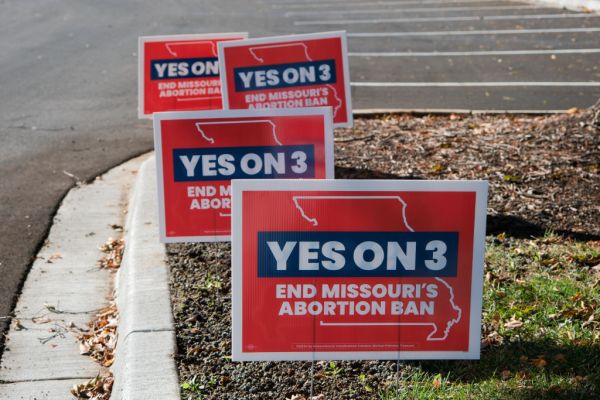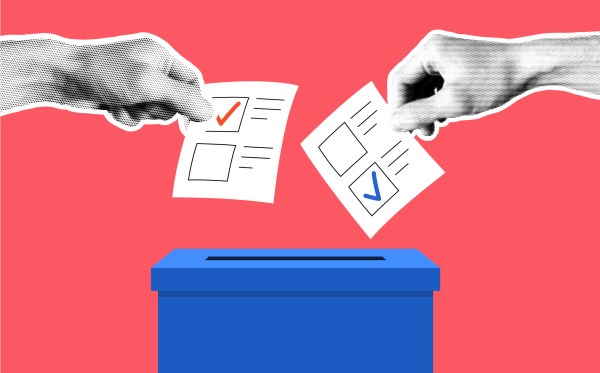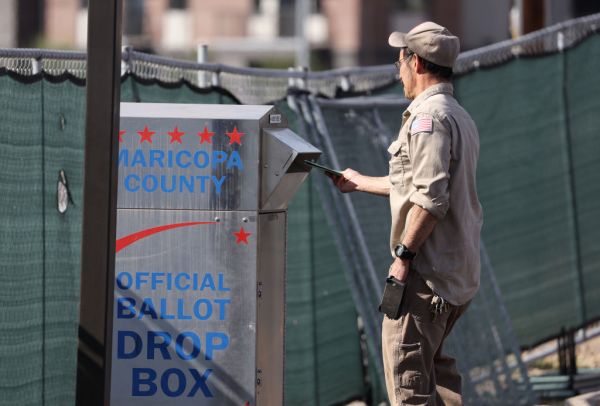NORCROSS, Ga.—It’s hard to make the case for Herschel Walker, the Republican candidate challenging Georgia Democrat Sen. Raphael Warnock, without talking about the past.
Here, for instance, was state attorney general Chris Carr, warming up the crowd at Walker’s Friday event in the parking lot of a local mall: “When I was a kid, I got in a lot of trouble because of him. I’d put on my Georgia T-shirt. I’d grab that football, and I’d dive over the couch, just like Herschel Walker used to do when he was scoring touchdowns. My parents said, ‘You’re gonna break that couch,’ but I didn’t care. I wanted to be like Herschel Walker, because Herschel was the leader.”
Walker’s heroic football history—a three-year run in the early ’80s in which he set numerous NCAA rushing records, won the Heisman trophy, and led the Georgia Bulldogs to three SEC championships and one national title—helped him breeze to victory in this year’s GOP Senate primary. (Early endorsements from Donald Trump and other top Republicans also helped him beat the first runner-up, agricultural commissioner Gary Black, by 55 points)
Talk to Walker’s supporters at events today, though, and you’ll notice an odd pattern: They’ve become oddly interested in avoiding the past.
“I think we look at a person’s past too much,” Atlanta resident Wayne Mahfuz said at the Norcross event. “If the person is straight, you know, straightened out and doing better, then we have to ignore that. We just can’t keep going and going and going and dredging up people’s past.”
Umang Patel, an Atlanta life insurance agent at the same event, added that “we don’t want to mix the personal thing with the politics. That is my stance. Everybody has their personal issues and past history and all that—you just look at the present; you don’t look at the past.”
Or here’s Shelley Manston, a UPS employee from Cartersville, two days earlier in Emerson: “I’m not saying that everything is true—there’s a lot of slander going on all over the place. But I think that people need to step back and offer that forgiveness.”
Maybe this shouldn’t be surprising. Walker, who recently retooled his campaign, is coming off a summer to forget. The candidate had endured news cycles about previously unreported illegitimate children, false claims of having worked in law enforcement, as well as inflated stories about his entrepreneurial endeavors. Then there is his documented history of mental illness, including past tendencies of violence. His former wife has accused him of threatening to kill her, and Walker himself has recounted the story of how he once drove to a nearby city, armed with a gun, with the intent of killing a delivery driver he thought had disrespected him.
Walker’s critics have argued that he’s a celebrity who’s woefully unprepared for the actual work of politics, circulating clips of some of the more far-out comments he’s made on the campaign trail: head-scratching riffs on climate policy (“Since we don’t control the air, our good air decided to float over to China’s bad air, so when China gets our good air, their bad air got to move”), the theory of evolution (“If that is true, why are there still apes? Think about it”), and the appropriate policy response to school shootings (“a department that can look at young men that’s looking at women that’s looking at social media”).
The accumulated weight of controversy took a toll on the Walker campaign, and his numbers sagged throughout the summer, occasionally polling as much as 9 or 10 points below Warnock. At the lowest point, his campaign seemingly tried not to sink any farther, barring media from public events for a time. The strategy seemed only to highlight the gaffes that leaked anyway.
By mid-July, the campaign changed course. Walker brought on a set of experienced GOP operatives to stop the bleeding, and it worked. In a matter of weeks, he found the discipline to keep the conversation on his strongest issues: the economy, “woke” politics, and attacks on Warnock’s voting record.
Walker has even worked a few disarmingly self-deprecating lines about his past controversies into his regular stump speech: “They’ve spent almost $50 million against me already, can you believe it?” he said Friday. “I told ’em, give me the money—I’ll make myself look bad.”
Meanwhile, he’s come back strong in the polls, even as the national environment has continued to sour for Republican candidates: Three polls in a row have now shown Walker with a small lead over Warnock.
Some of this surge was likely inevitable, with ostensible ticket-splitters who support Gov. Brian Kemp coming back to the Republican column. “It’s numbers drifting back to reality,” conservative activist Cole Muzio told The Dispatch. “Kemp is doing a great job elevating the whole ticket.”
Still, Walker’s apparent ability to tighten things up has helped. “You’d think the environment stabilizing for Democrats would have helped Warnock—particularly in a state so close that every little movement matters,” GOP consultant Brian Robinson said. “But things have largely stayed the same. Herschel is very much in it.”
Is Walker actually getting better prepared as a candidate or is his campaign just doing a better job keeping his unpreparedness under wraps? The best way to determine this would be a debate between the two candidates—but Warnock and Walker have played a game of chicken on the question.
Warnock committed months ago to attend three debates in Savannah, Macon, and Atlanta. Walker declined those but signed on to a fourth at a different TV station in Savannah—one where, the station’s invitation stipulated, the topics would be provided in advance. Last week, Warnock agreed to take Walker’s preferred debate, on two conditions: One, that both campaigns decline to see the topics in advance; two, that Walker agree to commit to one of the other three debates.
Asked whether he found Warnock’s terms acceptable Friday, Walker was cagey: “Show up for one. Show up for one. Then we can go forward.” So Macon or Atlanta is off the table? “I never said—I said show up for a debate.”









Please note that we at The Dispatch hold ourselves, our work, and our commenters to a higher standard than other places on the internet. We welcome comments that foster genuine debate or discussion—including comments critical of us or our work—but responses that include ad hominem attacks on fellow Dispatch members or are intended to stoke fear and anger may be moderated.
You are currently using a limited time guest pass and do not have access to commenting. Consider subscribing to join the conversation.
With your membership, you only have the ability to comment on The Morning Dispatch articles. Consider upgrading to join the conversation everywhere.